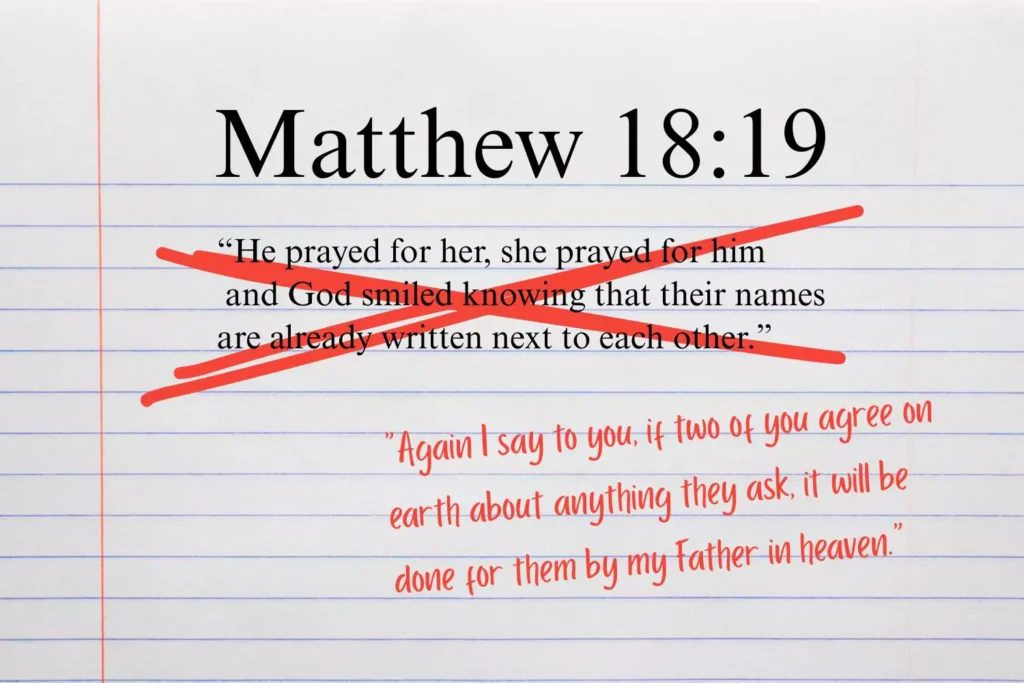What if the Bible verse you just shared on Instagram … isn’t in the Bible?
I recently saw a reel where a seminary student was asked if certain verses were real. One read, “Matthew 18:19: He prayed for her, she prayed for him, and God smiled knowing that their names are already written next to each other.”
Sounds nice, right? But it’s not in the Bible. The real Matthew 18:19 says, “Again I say to you, if two of you agree on earth about anything they ask, it will be done for them by my Father in heaven.”
Seeing this obvious discrepancy kind of freaked me out. I’ve never considered the possibility of people rewriting Bible verses. Honestly, I was shocked by how many people commented “Amen” to the fake verse — assuming, no doubt, that the verse was actually part of Scripture. The seminary student did an Instagram search and found dozens more pseudo-verses. He wrapped up the reel by urging viewers toward biblical literacy.
You’ve been duped
I didn’t know fake verses were a thing, but I guess I shouldn’t be surprised. I grew up in the era of the commercial that joked, “They can’t put anything on the internet that isn’t true.” Back then, it was clearly satire. But today? I worry that our culture has lost discernment. Too often, we fail to question what we scroll past.
After the above incident, I saw another reel where a pastor shared with his congregation his concern that if he added to the Bible during a sermon, most wouldn’t notice because they didn’t have their Bibles in front of them. His point? We need to know Scripture ourselves — thoroughly and accurately — especially in a world of reels, memes and even AI generated content.
I think generally I’m a pretty curious person. I question things before I accept them, though there are times I share something I learned with my husband and he’ll say, “Cite your source.” Often it’s a reel I’m referencing, so I’m definitely not perfect in vetting my sources.
I do, however, feel some conviction about how often I just believe what I see when I’m scrolling. That fake verse from Matthew would have made me pause, but if I’m honest, I don’t always double-check or validate everything I consume.
I don’t always carry my Bible to church, either. While I don’t think most pastors are out to trick us or use verses out of context (though they too are sinners and make mistakes), just like the seminary student pointed out, a knowledge of God’s Word is crucial. Here are a few suggestions to help you increase your biblical literacy.
1. Look it up yourself. When you read or hear a biblical passage or reference, look it up in a physical Bible or on a trusted Bible app like YouVersion. See with your own eyes whether that verse says what the person said it did; it’s a good habit to have.
2. Use discernment. If you hear something that sounds “scriptural” but you aren’t sure, listen to that check in your spirit and dig for the truth. If you only know a few words of the verse or concept, google them and find the source. Be cautious of trusting the AI summary at the top. Let it be a tool to help you identify the Bible passage, then look it up (see point number one).
3. Ask questions. Ask questions of trusted mentors or spiritual leaders. If you hear or see something that you aren’t sure about, ask them to help you understand. It’s OK to ask questions. One of my favorite sayings is that “the truth is unafraid of questioning.” If it’s biblically sound and scripturally correct, then the proof will be there. And like my husband reminds me: cite your source!
4. Know the context. Biblical accuracy isn’t just about knowing a single verse; it’s about knowing the surrounding narrative (the verses leading up to and following the verse in question), the author, and the audience. A study Bible and other reference books can be a huge help with this. These elements help you fully understand what was originally intended by the text. If you know the original intent, it’s easier to determine whether what you’re seeing online or elsewhere is being taken out of context.
To spot a counterfeit, know the real thing
Scripture tells us to have God’s Word written on our heart. It is crucial for us to know what God’s Word actually says so we can discern truth from lies.
You don’t have to memorize the Bible or learn it all in one sitting. Simply by spending consistent time in God’s Word and referencing your Bible when verses are mentioned, you’ll be surprised to find how quickly it is stored in your mind and heart and able to be recalled (Psalm 119:11). I’m always shocked when I can finish my pastor’s sentence as he quotes Scripture. I don’t know when or how I learned most of the verses I have memorized, I just know they come out of nowhere because they are written on my heart.
So the next time you hear or see a verse quoted, pause and look it up. It may be the habit that keeps your faith rooted in truth. Let’s follow that seminary student’s advice and work to be a generation that is biblically literate.
Copyright 2025 Focus on the Family. All rights reserved.










